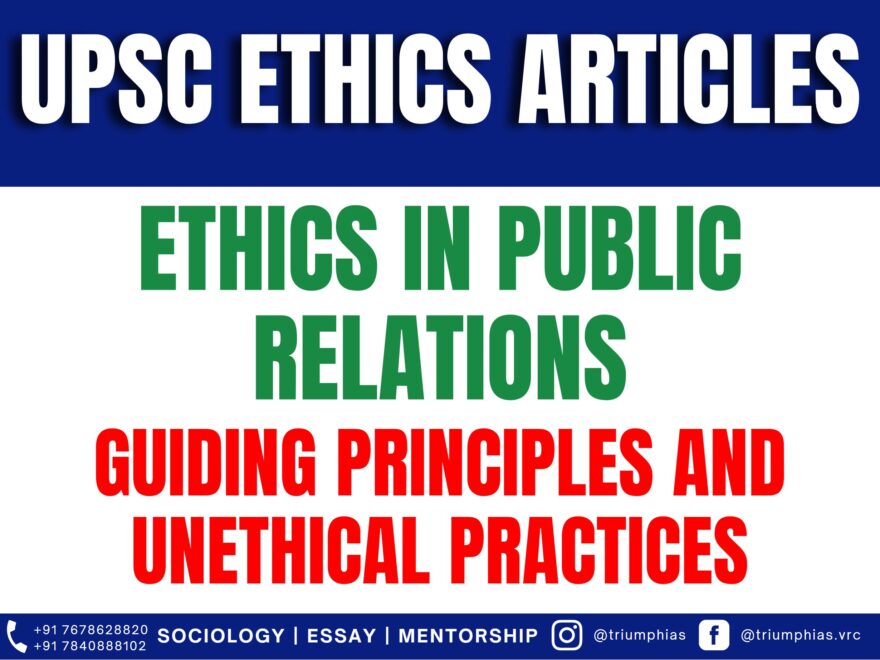Ethics in Public Relations
(Relevant for Ethics, Integrity and Aptitude)

Public relations entail a long-term commitment aimed at persuading and fostering mutual understanding by garnering the voluntary acceptance of attitudes and ideas. The success of public relations hinges on the foundation of ethical principles and the utilization of truthful means. In this field, it is essential to acknowledge that the ends can never justify the use of false, harmful, or questionable methods.
Nevertheless, discerning what is ethical and what is unethical poses a challenge. It may be simpler to frame it as a matter of making choices between right and wrong, guided by one’s conscience. Actions that induce cognitive dissonance evoke feelings of guilt and dishonesty, rendering dishonest communication ineffective in nurturing relationships. The public should not be underestimated, as they are not easily deceived. As Abraham Lincoln aptly stated, “You can fool some people all the time and all the people some of the time, but you cannot fool all the people all the time.”
There exist various acts that can be classified as unethical within the realm of public relations, ranging from the suppression of unfavorable news to misleading the audience. Unethical practices in public relations may encompass:
- Suppressing unfavorable news
- Misrepresenting facts
- Delaying information to serve one cause while benefiting another
- Making promises that cannot be fulfilled
- Employing undesirable tactics to pressure editors into carrying publicity material
- Engaging in embedded news
As education levels rise, both counselors and the public have become more aware of their rights. Public relations practitioners may encounter pressure groups such as trade unions, consumer protection organizations, environmental activists, and more. Therefore, it is vital for a public relations professional to exercise self-regulation, adhere to ethical standards, and be mindful of the legal aspects of communication.
The significance of clearly defining ethics and the values that shape and uphold the public service cannot be overstated. This is crucial in providing both public officials and the general public with a shared framework for understanding the principles and standards to be upheld. It also helps public officials develop an understanding of the ethical considerations involved in delivering effective and efficient public services.
An illustration of the importance placed on these ethical principles can be seen in the “Seven Principles of Public Life” outlined by the Nolan Committee in the United Kingdom.

These principles are as follows:
- Selflessness: Public office holders should base their decisions solely on the public interest, without seeking personal financial or other benefits for themselves, their family, or their friends.
- Integrity: Public office holders should not allow themselves to be influenced by financial or other obligations to external individuals or organizations that may impact their official duties.
- Objectivity: When conducting public business, including making appointments, awarding contracts, or recommending individuals for rewards and benefits, public office holders should make choices based on merit.
- Accountability: Public office holders are accountable for their decisions and actions to the public and should be subject to appropriate scrutiny in line with their position.
- Openness: Public office holders should strive to be transparent about their decisions and actions, providing reasons for their choices and limiting the restriction of information only when the broader public interest necessitates it.
- Honesty: Public office holders have a duty to disclose any personal interests related to their public duties and take measures to address conflicts in a manner that safeguards the public interest.
- Leadership: Public office holders should demonstrate leadership and set an example by promoting and supporting these principles. A mnemonic to remember them could be SIO-AO-HL (create a personal acronym that relates to your own life, which can be humorous or have a personal connection, to remember these principles).
- By adhering to these principles, public officials can ensure ethical conduct and uphold the trust and confidence of the public they serve.
To master these intricacies and fare well in the Sociology Optional Syllabus, aspiring sociologists might benefit from guidance by the Best Sociology Optional Teacher and participation in the Best Sociology Optional Coaching. These avenues provide comprehensive assistance, ensuring a solid understanding of sociology’s diverse methodologies and techniques.
Best Sociology Optional Teacher, Best Sociology Optional Coaching, Sociology Optional Syllabus, Public Relations, Ethics, Unethical Practices, Seven Principles of Public Life, Public Officials, Trust, Accountability, Transparency, Integrity, Selflessness, Nolan Committee.
Follow us :
🔎 https://www.instagram.com/triumphias
🔎https://www.youtube.com/c/TriumphIAS
https://t.me/VikashRanjanSociology
Find More Blogs
|
Scope of the subject and comparison with other social sciences |
|||
|
|
|
|
Modernity and social changes in Europe |

